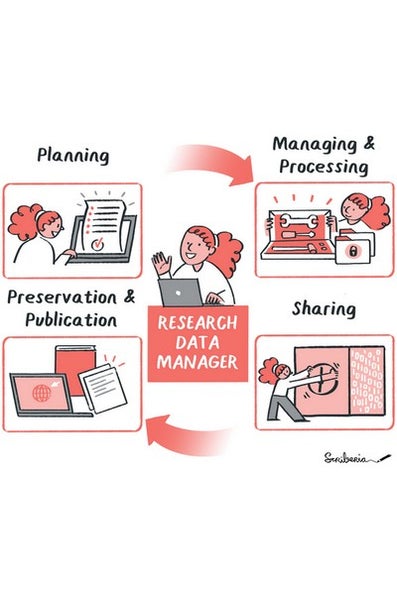Why has data management become so important in your field?
At AIMMS our focus is on molecular life sciences – the study of molecules in living systems, of how molecules affect living systems, and of the molecular mechanisms of how drugs work, how toxic compounds work, and how cells work. For biologists, the generation of data is getting less and less labor-intensive, and the interpretation of the data is getting more and more complicated.
Does this mean that researchers need to acquire new skills?
Yes, bioinformatics, data analysis, and data science are becoming more and more prominent in biology and also in chemistry. It would be a good idea for any bachelor programme in the life sciences to include proper data management, data science, and a little bit of programming and maybe bioinformatics in the curriculum. We’re developing such courses for the bachelor students of the Faculty (of Science).
Why did you think a dedicated research data manager was needed?
People in the life sciences community have been talking a lot about the importance of Research Data Management (RDM). When you think about biobanks and other types of big data collections, it is obvious that you have to sort out your data management, but what about a PhD student doing simple experiments in the lab using Excel to process data? How do we help them? As a Principal Investigator, I have no idea how to instruct my students in RDM. I’m not an expert. So I needed support. I needed somebody who actually has the time to look up what tools are available and who can translate general policies and general infrastructure into daily practical solutions that fit our local needs. There’s a huge gap between policy and implementation for people doing the daily work. We need discipline specific support and we need hands-on help.
What skills did you look for in a data manager?
I wanted somebody who understands our field of work, who understands the data management side of things, and who also understands the technologies.
Was it difficult to find the right person for the job?
I happened to have Brett Olivier in my group and I could convince management that research data support was worth the investment. Brett is a biochemist with a strong theoretical background, but he also knows how to do experiments, so he can talk with everybody. He has also moved into programming and writing scientific software. Having this technical background means he can talk with people in IT. So he is the perfect guy.
What is Brett doing in concrete terms?
He writes the Data Management Plans (DMPs) for project proposals and supports their implementation. He has been actively involved in the piloting and implementation of a new data management platform with AIMMS researchers. Brett has developed encoding standards for computational models of biological systems. Because of that, he knows how important it is to annotate data using appropriate ontologies and thereby making them more FAIR (Findable, Accessible, Interoperable and Reusable). Many scientists don’t know what an ontology is, let alone use it. Brett will address this and related RDM issues by providing advice on what the current best standards, tools and practices are in the field.
Well implemented data strategies can contribute to the quality and efficiency of a research project.
Take research data management seriously and organize discipline specific support
I hired the right person at the right time”, says Prof. Bas Teusink , Scientific Director of the Amsterdam Institute for Molecules, Medicines and Systems (AIMMS).
His institute was founded in 2010 on the back of major breakthroughs in the fields of molecular, cellular and systems biology. Recently, rapid changes in the pace of data acquisition and data volume in this field asked for the hiring of a dedicated Research Data Manager.

'I wanted somebody who understands our field of work, who understands the data management side of things, and who also understands the technologies.'